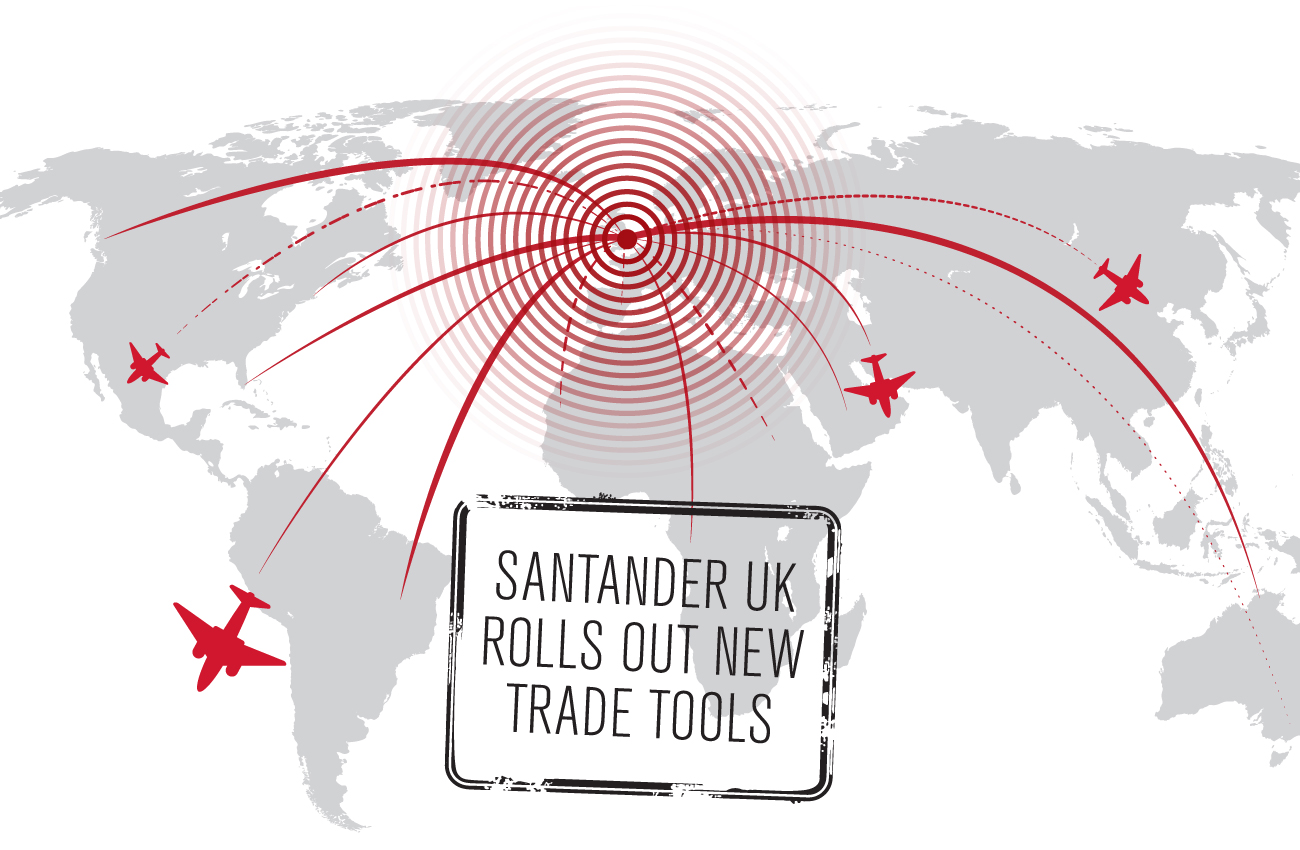Santander UK has launched new trade tools and signed partnerships to boost international trade for the UK SME and MSB markets. To discuss the bank’s new focus Jason McGee-Abe sat down with Mark Ling, head of international, large corporate, and Mark Collings, UK director, international, from the Santander Corporate & Commercial Banking team, to find out more.
GTR: What is Santander’s strategy in the UK to increase its market share and support importing and exporting businesses?
Collings: Since Santander acquired three major UK high street brands – Alliance & Leicester, Abbey, and Bradford & Bingley – in 2005, we have grown our UK corporate and commercial market share from 1% to 6%. Our aspirations are to attain 10% of market share by 2016, with a vision to IPO at some point in the UK. We’re now in a really exciting position about going into the market with our new innovations and partnerships. As much as we can talk about our aspirations we’re now starting to tangibly back them up with real business being developed from an international trade perspective in the UK and overseas.
Ling: We are at the forefront of using the UK as a key market for our global diversification.
GTR: What has it done to support this strategy globally?
Collings: Internationally, Santander is concentrated in 10 core countries, in which we have a market share of more than 8%.
Globally, 87% of our business is focused on retail and commercial banking, it’s not focused on investment banking. Our message is that we are the SME bank of choice. We’re not just saying that in the UK but as a global business.
Ling: Supplier finance, which is something which all the banks have been working on for the last 14 to 15 years, has been very much focused at the multinational level. Our plans are to go into the mid-market and SME market. There is no bank that I know of in the UK that is actively doing this. For us, it’s all about facilitation of the growth of business by MSBs and SMEs.
GTR: You do not have a presence in a number of major territories, like India and China, what are you doing to support clients doing business in those territories?
Collings: Looking at India and China, are we realistically going to build assets down on the ground to give us that coverage to help SMEs with the supply chain? The answer is no.
Ling: That’s when international partnerships come into effect. We don’t want to necessarily be in partnership with the biggest corporate banks in these territories, as we want a bank which is as hungry as we are to develop SME relationships and support businesses. We’re not foolish enough to think that we can do it all ourselves; we can’t. We won’t be able to build the scale and infrastructure in those local markets, so we have to work with strategic partners. In the Middle East, we’re developing a strategic partnership with Abu Dhabi Commercial Bank. In India, it’s quite early days, but we’re working with ICICI bank. In Japan, we’ve got Mizuho Bank. With China, earlier this year, the bank acquired an 8% share in Bank of Shanghai, so clearly that gives us coverage in one of the key economic areas of China. We will build our coverage there and also help build their client base in the UK and around the world. It’s early days for the partnership, but it’s a clear sign of intent that we can’t ignore China and need to have capability there.
GTR: How is the bank using technology to support this strategy?
Ling: We’re harvesting web-based solutions and boosting value-added services to our clients to support their international growth ambitions. It’s a new connected world and the bank is working in partnership with information and technology providers to give our clients powerful tools to support their businesses.
Collings: We can add real value to UK SMEs with not only our true global coverage, but through innovations such as Trade Portal, Trade Club and our Passport programme.
Ling: Trade Club launched in early July and helps clients to access overseas markets, find international partners and source export opportunities. There’s also free ICC courses and webinars available. Harvesting the power of a potential community of five million businesses internationally, you can see the opportunity to develop and prosper is significant.
Collings: The Trade Portal launched in 2014 and it helps to simplify the trade process by providing accessible information on market opportunities, legal and set up, currency risk information plus documentation on shipping.
Ling: The Portal effectively has 180,000 pages of information. It also provides the actual names and contact details of potential importers and exporters allowing businesses to make contact and gauge interest from prospective customers and suppliers without using up significant resources speculatively.
Another area which has also been recently launched globally by the group is an in-house initiative called Passport.
Collings: The key bit here will be around the credit risk decision-making and allocation of capital. If you’re a fairly small subsidiary, which is not proven or hasn’t got much presence on the ground, look in isolation as to whether they’d fund that business. Bring in the parent and it’s a completely different view, so through the support of the Passport programme, factoring in the whole group, we get a different picture of the risk of that business and are more favourable to financially support it.
We also have the Breakthrough Programme, which harnesses all the ingredients for organic growth. It’s built on pillars, such as providing growth capital to SMEs to fast-track their growth, graduate placements, Trade Missions and Master Classes where we provide UK SMEs with the opportunity to learn from iconic UK brands and businesses.








